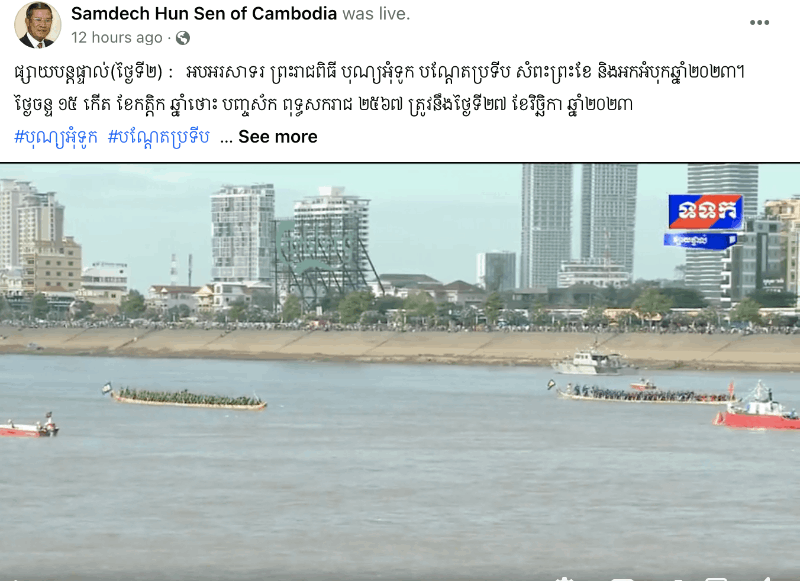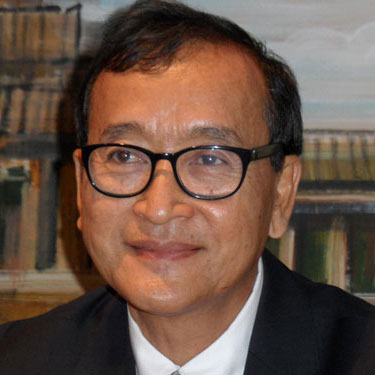Distortion of visual reality is one of the techniques by which the Hun Manet regime attempts to project a false image of modern Cambodia to the world.
Images circulating on social media claiming to depict a peaceful and contented country are literally a triumph of form over substance. The only problem is that they are inventions with no existence in the real world.
The country’s Water Festival held in Phnom Penh in November is a case in point. Packed crowds bask under the national flag as they enjoy the event, if social media is to be believed.

An examination of the photo against real videos taken at the event show that the image is false. The depiction of the flags isn’t accurate, and in reality there are more tall buildings in the background than shown. There were no boats of such size at the event, and the crowd was much smaller than depicted.
Here’s One We Made at Home
Such images are easy for anyone to fabricate using tools such as ChatGPT. This one was done with a few clicks:

Below is a real image of the Water Festival which was published on the Facebook page of former prime minister Hun Sen.

Visual representations of the reality of modern Cambodia are an especially sensitive topic which the regime seeks to control at every turn. Western human rights activists in Cambodia are very rarely imprisoned to avoid negative publicity, but Australian filmmaker James Ricketson was jailed in 2017.
His crime was flying a drone above a rally organized by the democratic opposition Cambodia National Rescue Party (CNRP) ahead of local communal elections. Images gathered by the drone risked creating visible proof of the true level of support for the CNRP, dissolved by order of the politically controlled supreme court later that year.
Water Festival Tragedy
Cambodia’s annual water festival has a chequered history. The event in 2010 ended in tragedy when over 350 people were killed during a crush on a bridge. Researchers have established that poor planning by organizers included closing a separate bridge earlier in the day, putting extra pressure on a small bridge not designed to cope with the estimated 8,000 people who crowded onto it.
Survivors reported having been electrocuted by police firing water cannons in an attempt to control the crowd. Within days, the government had released a report which exonerated the authorities for poor event planning and management, putting the blame on the innocent people trapped in the crush.
In recent years, the question of whether the festival is held has become a political barometer which gauges the extent to which the dictatorship feels secure in allowing large crowds to gather in the capital. In some years, this has been judged too politically risky and the event was cancelled. The regime now feels secure enough to allow the festival to restart and to use it as an excuse for its exercises in political propaganda.
Congratulations, Prime Minister
Fake images are one of the few tools available to the regime of Hun Manet, who took over as prime minister from his father in August.
The following month, Hun Manet went to New York to address the United Nations General Assembly. He told the assembly that the national elections in Cambodia in July were free and fair, when in fact, as in 2018, no recognised opposition party was allowed to take part.
Images showing a message of congratulations to him on a billboard in New York’s Times Square were pumped around social media.
The only problem was, as reporting by Abby Seiff for Radio Free Asia established, that the images were fake. No such billboard advertisement ever existed.
The reality is that Cambodians in 2023 are struggling under the burden of some of the highest levels of microfinance debt relative to their incomes in the world. Most young people have no hope of ever securing formal employment in Cambodia and in increasing numbers are taking their chances on emigrating to Thailand to find any kind of work they can. The regime has no credible strategy for moving Cambodia up from a least developed economy towards middle-income status. The best it can do is to promote fabricated pictures of an imaginary Cambodian idyll.
The views and opinions expressed in this article are those of the author.

Sam Rainsy, Cambodia’s finance minister from 1993 to 1994, is the co-founder and acting leader of the opposition Cambodia National Rescue Party (CNRP).

